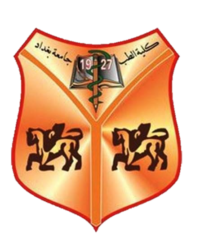Curriculum Description
This course description provides a necessary summary of the most important characteristics of the course and the expected learning outcomes for the student to achieve evidence of whether they made the most of the available learning opportunities. It must be linked to a description of the program.
General Description
| Category | Details |
|---|---|
| Name of Organization: | Baghdad College of Medicine |
| Department: | Biochemistry Department |
| Module Name: | Molecular Basis of Medicine |
| Course Pattern: | Large group and small group lectures, laboratories, team and self-based learning, visiting training laboratories |
| Semester and Year: | 1st Year / Semester 2 |
| Total Course Hours: | 2 practical hours + 38 theoretical hours |
Goal of the Course
Molecular Basis of Medicine provides an introduction to biochemistry, cellular and molecular biology. The course will cover not only well-established findings but also recent advances that have a particular importance in medicine. It aims to provide students with a strong foundation, and the tools to understand the role that biochemistry, cell and molecular biology will have on the future practice of medicine.
Outcome of this Module
A. Cognitive and Theoretical Goals:
- Recognize the chemical basis of protein structure and how external factors can influence it.
- Evaluate how proteins can act as enzymes that control reactions.
- Describe the pathways involved in cellular metabolism, especially those pathways involved in energy transduction leading to the formation of ATP from food.
- Discuss the biosynthetic pathways involved in polysaccharide, lipid, and amino acid synthesis.
- State how hormones can influence metabolic pathways in different ways according to their chemical structures and properties.
B. Skills:
- Explain a small number of biochemical investigations.
- Evaluate how clinical biochemistry contributes to the diagnosis, treatment, and monitoring of disease.
Methods of Learning
- Large group lectures
- Small group lectures
- Laboratories
- INLE site interactive discussion posts and scientific videos
- Google classroom lectures
Methods of Assessment
- INLE site interactive quizzes
- Multiple choice questions
- Assay-based questions
Values and Sentimental Goals
- Learning through scientific discussions and clinical reasoning
- Importance of respecting time and accomplishing tasks within time limits
- Team-based learning
- Professional safety when dealing with Laboratory samples
General and Qualifying Skills
For the molecular basis of medicine an introduction to biochemistry, cell and molecular biology. The course will cover not only well-established results but also recent developments that are of particular interest in the field of medicine. The program aims to provide students with a strong foundation and tools to understand the fundamental role of biochemistry, cell and biology. It will have an impact on the future practice of medicine.
Infrastructure
| Week | Topics | Hours |
|---|---|---|
| 1st Week | Acids & Bases, Amino acid | 3 hours |
| 2nd Week | Enzyme, Coenzyme, carbohydrate metabolism | 3 hours |
| 3rd Week | Glycolysis, Krebs cycle | 2 hours |
| 4th Week | Glycogen metabolism, Gluconeogenesis | 2 hours |
| 5th Week | Pentose phosphate pathway, Lipid structure, Cholesterol, lipoprotein | 4 hours |
| 6th Week | Fatty acid and N2 Metabolism, DNA structure and replication, RNA structure, Hormone classification, Hormone regulation | 6 hours |
Course Books Required
- Lippincott's Illustrated Reviews: Biochemistry by P.C. Champe, R.A. Harvey, and D.R. Ferrier.
- Clinical chemistry & Metabolic medicine by Martin A. Crook
Main References (Sources)
- Harper's Biochemistry by R.K. Murray, D.K. Granner, P.A. Mayes, and V.W. Rodwell.
- Biochemistry by Lubert Stryer.
- Textbook of Biochemistry with clinical correlations by T.M. Devlin
- Clinical Biochemistry: Metabolic and Clinical Aspects by WJ Marshall and SK Bangert.
Recommended Resources
- Electronic references: INLE Iraqi Network Learning Environment

